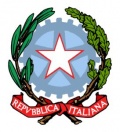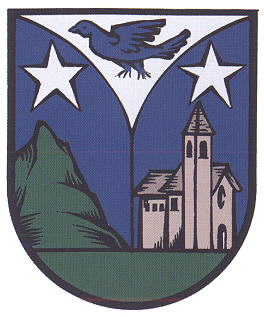Berbenno di Valtellina: Difference between revisions
Knorrepoes (talk | contribs) m (Text replacement - "===Official blazon===" to "{| class="wikitable" |+Official blazon |- |'''Italian''' | ") |
Knorrepoes (talk | contribs) m (Text replacement - "===Origin/meaning=== The" to "===Origin/meaning=== The") Tags: Mobile edit Mobile web edit |
||
| Line 21: | Line 21: | ||
===Origin/meaning=== | ===Origin/meaning=== | ||
The arms are known since the 16th or 17<sup>th</sup> century. The pigeon in the upper part is the symbol of the local patron saint, St. Maria Assunta. The arms further show the local church and an indication on the mountainous terrain. The two stars most likely are derived from the arms of Pio Rajna of Sondrio, who used six-pointed stars in his arms. | The arms are known since the 16th or 17<sup>th</sup> century. The pigeon in the upper part is the symbol of the local patron saint, St. Maria Assunta. The arms further show the local church and an indication on the mountainous terrain. The two stars most likely are derived from the arms of Pio Rajna of Sondrio, who used six-pointed stars in his arms. | ||
Revision as of 06:19, 18 July 2022
Italy heraldry portal
This page is part of the Italy heraldry portal |
Heraldry of the World |
|
Civic heraldry:
|
Other heraldry: |
BERBENNO DI VALTELLINA
Region: Lombardia
Province : Sondrio
| Italian |
Partito: nel primo d'azzurro alla rupe scoscesa di verde, sormontata da una stella a cinque raggi d'argento; nel secondo pure d'azzurro, alla chiesa vista in prospettiva d'argento con la facciata e il campanile a sinistra, sormontata da una stella similare; l'insieme è fondato sulla campagna di verde; al capo appuntato e ritorndato d'argento, carico di una colomba sorante d'azzurro. |
| English | di Valtellina No blazon/translation known. Please click here to send your (heraldic !) blazon or translation |
Origin/meaning
The arms are known since the 16th or 17th century. The pigeon in the upper part is the symbol of the local patron saint, St. Maria Assunta. The arms further show the local church and an indication on the mountainous terrain. The two stars most likely are derived from the arms of Pio Rajna of Sondrio, who used six-pointed stars in his arms.
Contact and Support
Partners:
Your logo here ?
Contact us
© since 1995, Heraldry of the World, Ralf Hartemink 
Index of the site
Literature : Foppoli, 1999












